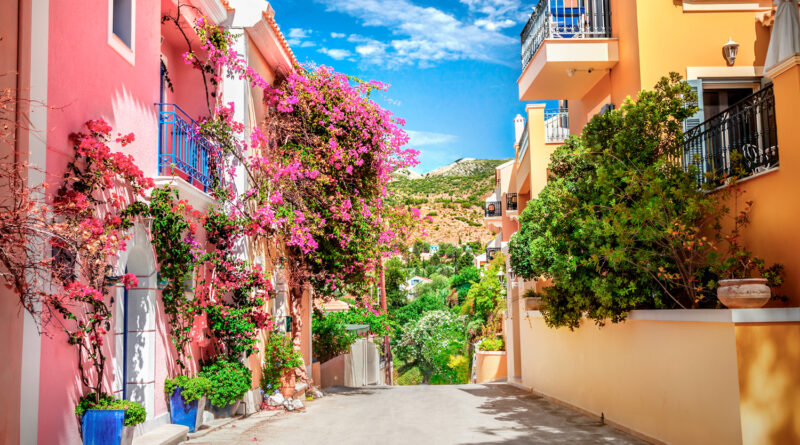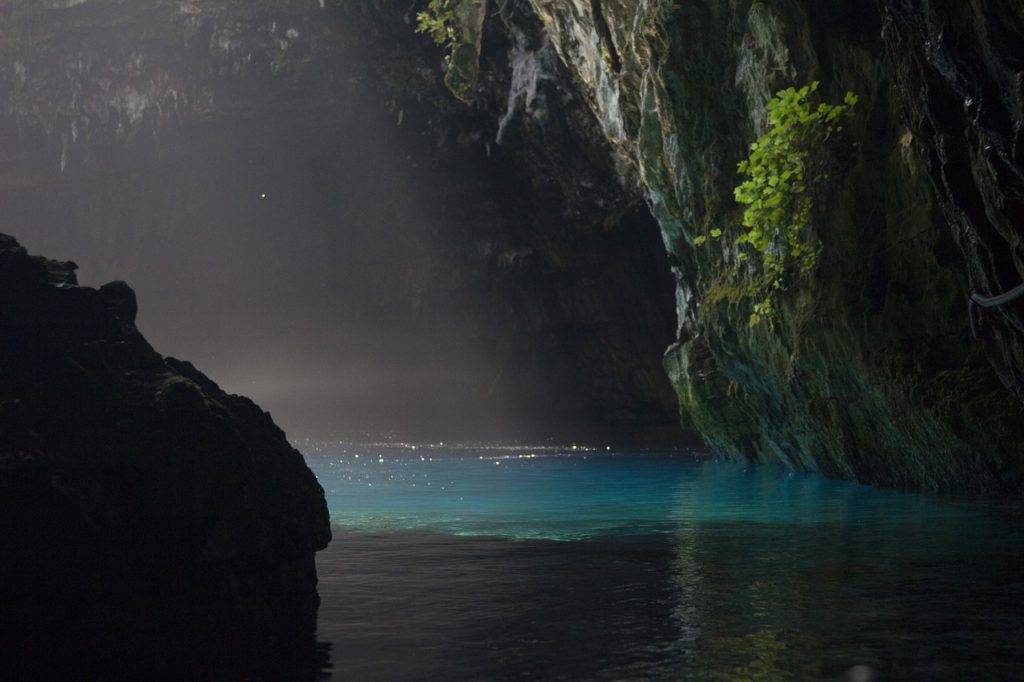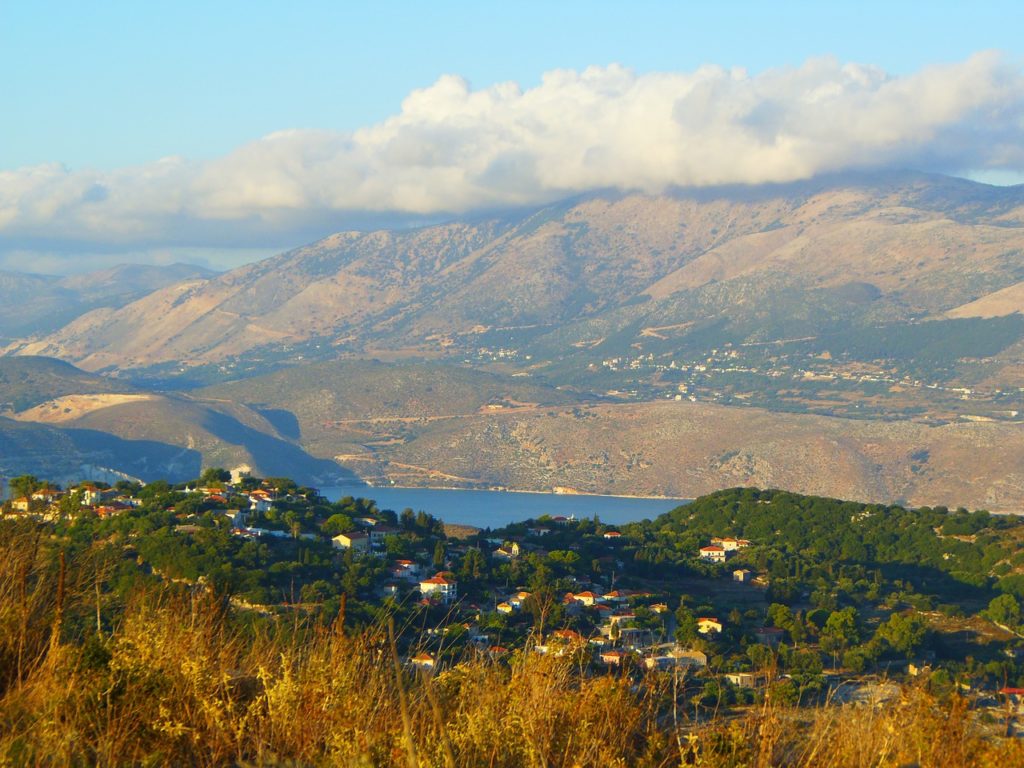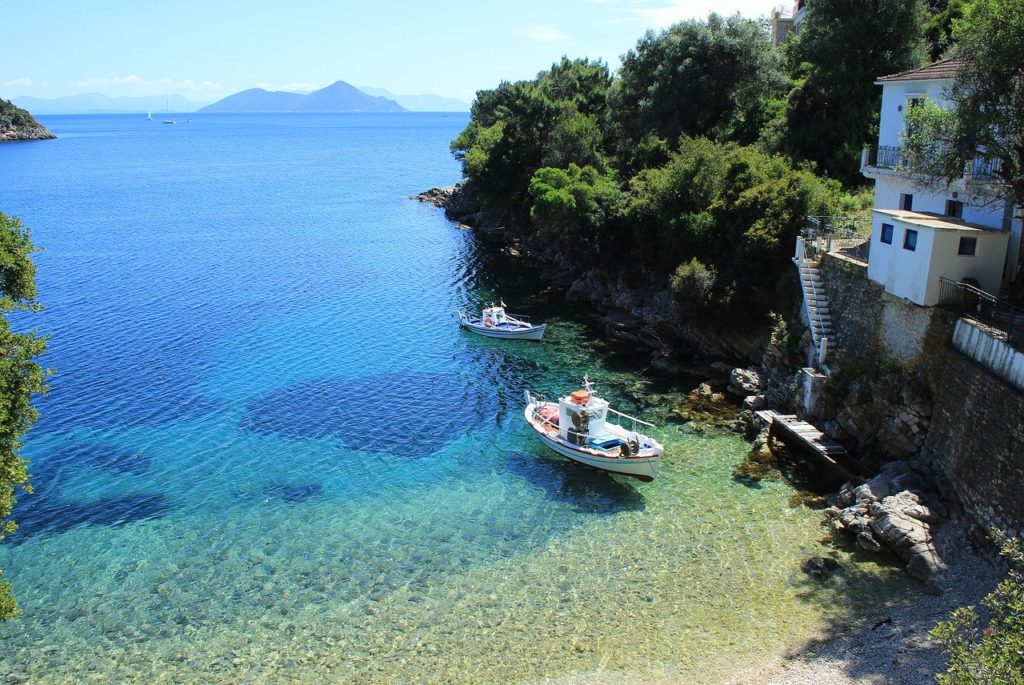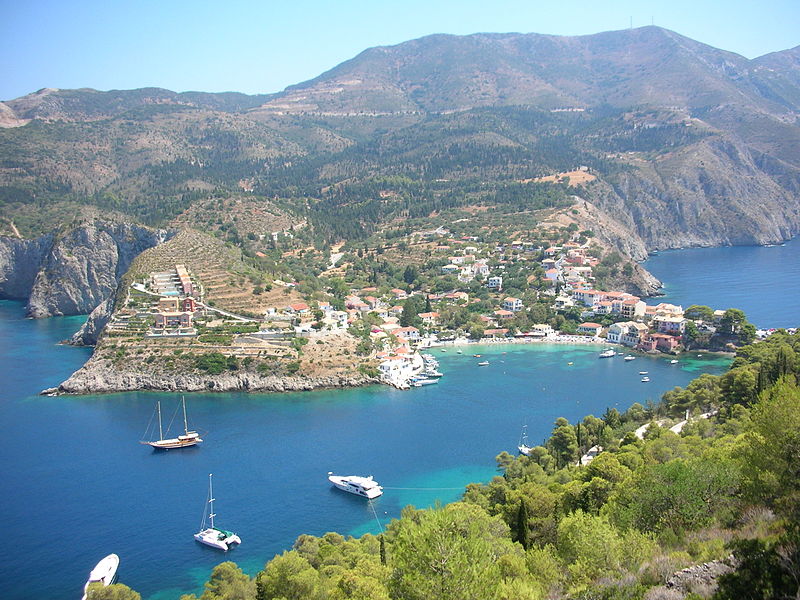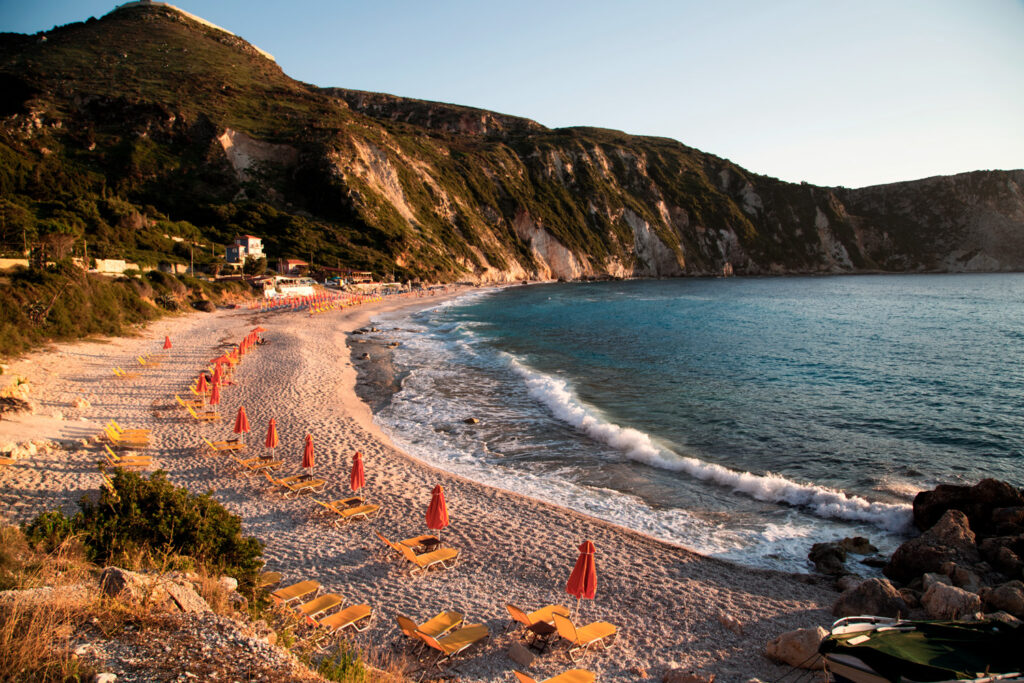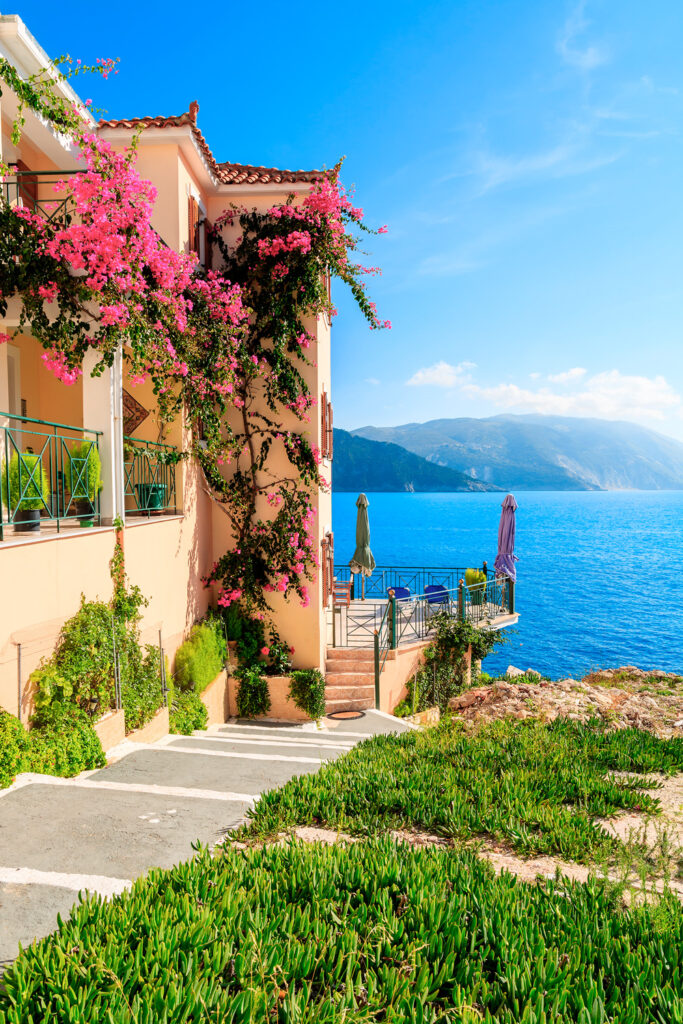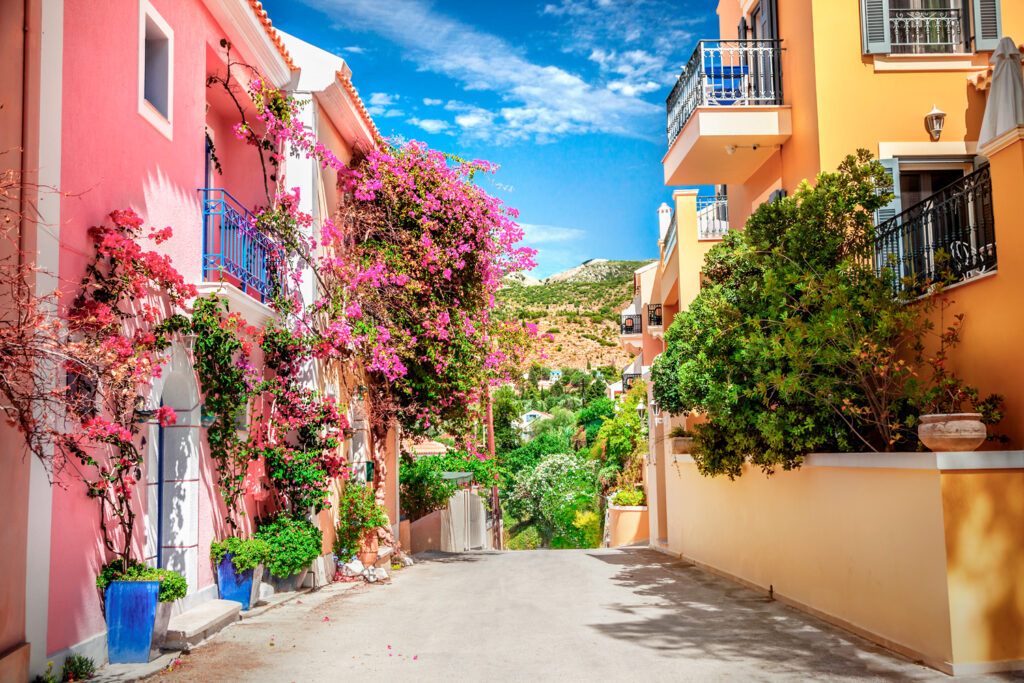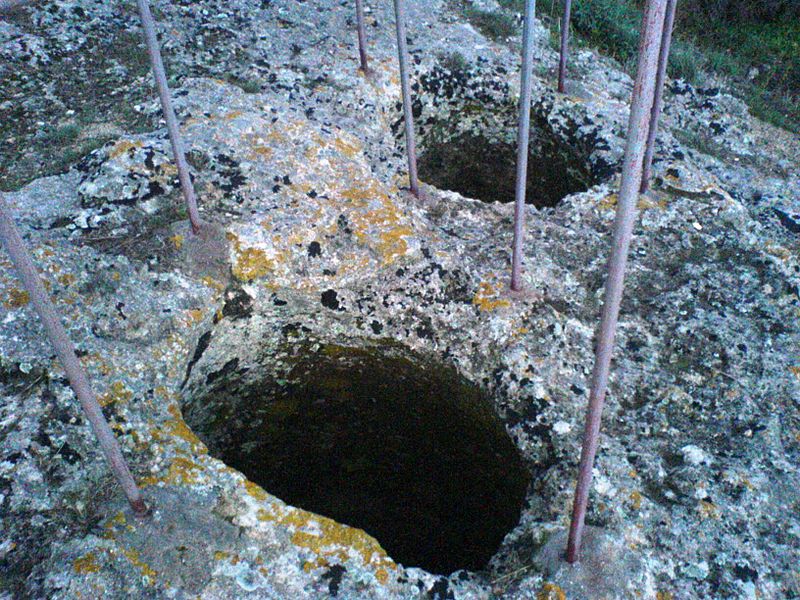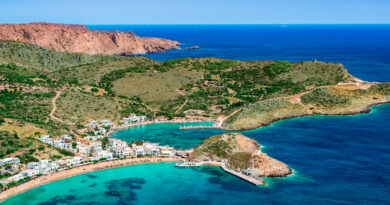Kefalonia – Unique Beauty with Breathtaking Beaches and Quaint villages
Kefalonia is a gem in the Ionian Sea. With its breathtaking beaches and crystal-clear waters in shades of turquoise and blue it is going to surprise you with its beauty. It has a long and exciting history and a rich cultural tradition.
Top 10 things to do in Kefalonia
Kefalonia Tours, Tickets, Activities & Things to Do
How big is Kefalonia?
What is Kefalonia like?
What does “Kefalonia” mean in Greek?
Where is Kefalonia?
Kefalonia Beach Guide
Kefalonia Airport
What to do in Kefalonia?
What to see in Kefalonia?
When to visit Kefalonia?
Kefalonia – Weather and Climate

Top 10 things to do in Kefalonia
- Enjoy the romantic sunset in Fiskardo
- Have a refreshing drink at Myrtos Beach
- Try a boat ride into Melissani Cave and discover the lake
- Spend a few hours at the Archaeological Museum of Kefalonia in Argostoli
- Visit the 16th century Venetian castle in Assos village. It is one of the biggest castles in all of Greece.
- Explore Ainos National Park
- Visit the monastery Saint Gerasimos
- Discover the Drogarati Cave
- Follow the Kefalonian wine routes and taste the Robola varietal
- Visit the beautiful Lighthouse of Saint Theodore known as “Fanari”
Kefalonia Tours, Tickets, Activities & Things to Do
Do you want to learn about all the activities you can choose from in Kefalonia? Check the best things to do, the prices and availability in the link below.
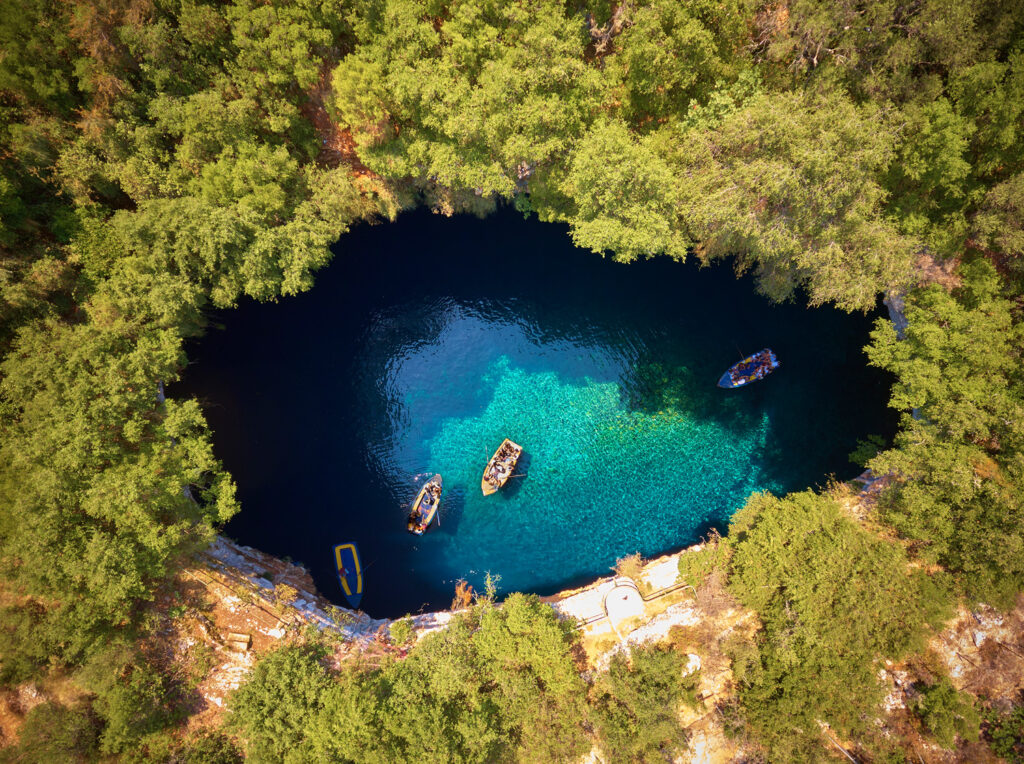
Kefalonia Tours
TICKETS & THINGS TO DO:
How big is Kefalonia?
Kefalonia is the largest of the Ionian Islands in western Greece. The capital of Kefalonia is Argostoli. The size of the island is around 780 km2 with 55 people per km2. The town of Argostoli has one-third of the island’s inhabitants. Lixouri is the second largest town, and the two together account for almost two-thirds of the population.
What is Kefalonia like?
The green mountains blending with the blue sea makes it truly unique and a popular destination. Pine, cypress and olive trees cover the peak of Mt. Ainos, while at the mountainfoot you’ll come across vineyards where the popular Kefalonian Robola wine variety is produced.
The island is quite mountainous with no less than four great mountains of which the highest is Mount Ainos, with an elevation of 1628m; to the west-northwest are the Paliki mountains, where Lixouri is to be found, with other mountains including Gerania and Agia Dynati. The top of Mount Ainos is covered with Abies cephalonica trees and is a natural park. Among important natural features are the Melissani and the Drogarati caves.
What does “Kefalonia” mean in Greek?
Kefalonia was named after the hero-figure Kefalos (Greek mythology), the first ruler of the island, who was an Athenian leader and son of Dionysus. Kefalos, having been expelled from Athens for a murder, was exiled and settled on the island, where he afterwards became the ruler. Another myth tells that the hero Kefalos was rewarded with the island of Same (Samos) after having helped Amphitryon of Mycenae in a war against the Taphians and Teleboans. The island thereafter came to be known as Cephallenia / Kefalonia.
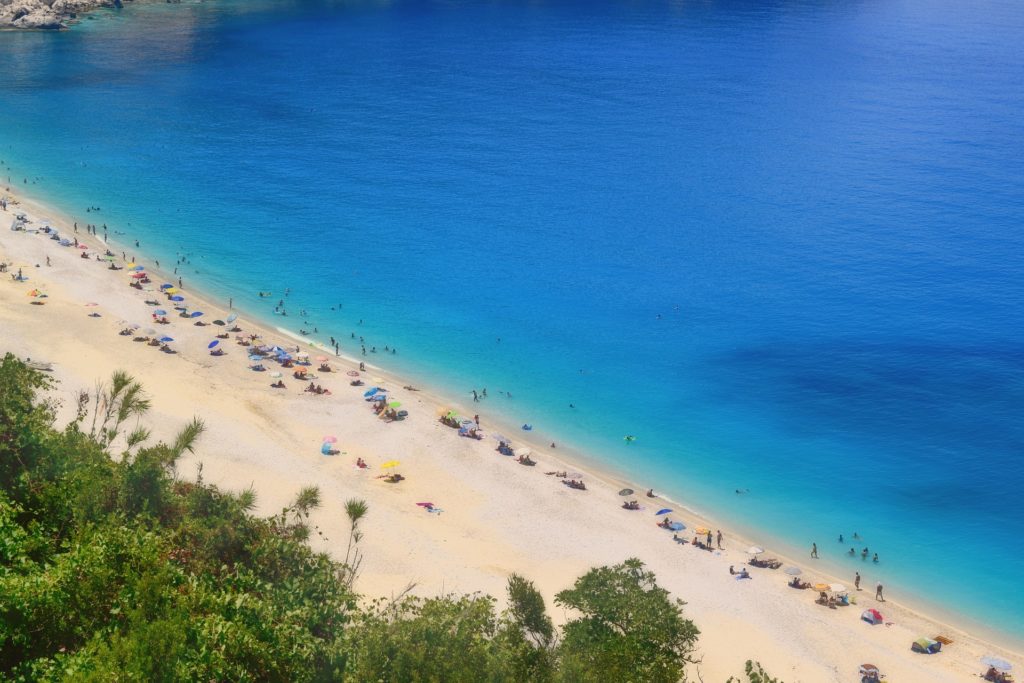
Where is Kefalonia Greece?

Island hopping to Zakynthos, Lefkas and Ithaca
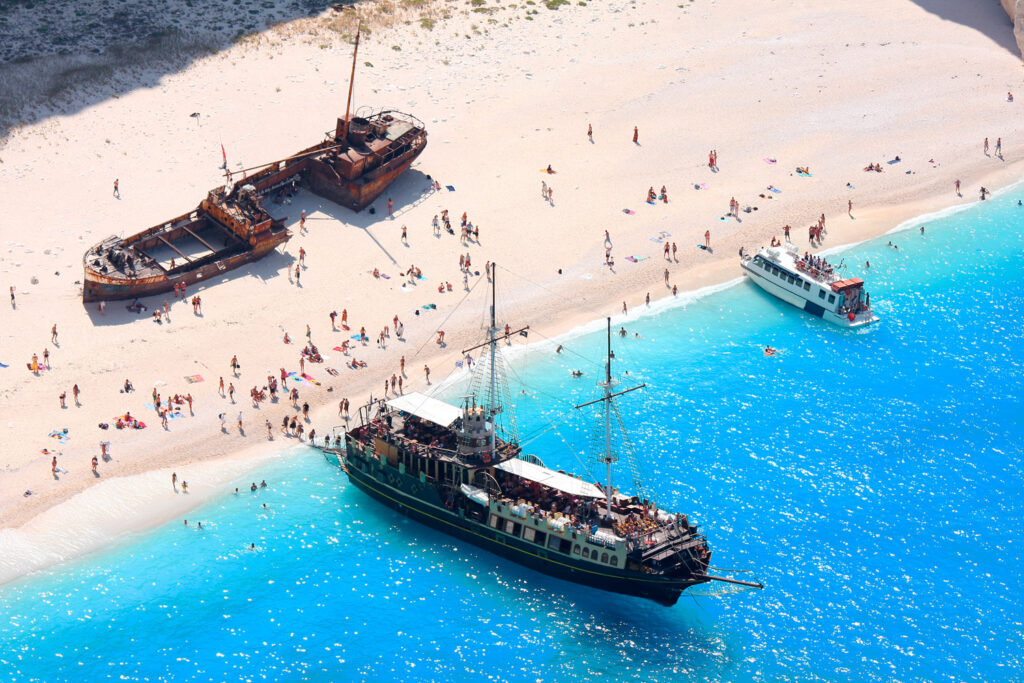
Zakynthos Tours
TICKETS & THINGS TO DO:
There are five harbors and ports in the prefecture of Cephalonia: four main harbors on the island; Same (the third largest town) is a major port with links to Patras and Ithaca. Poros, in the south, has ferry routes to Kyllini at the coast of Peleponnes; Argostoli, in the west, is the largest port, for local boats and ferries to Zante (Zakinthos) and regularly to Lixouri; Fiscardo, in the north, has links to Lefkas and Ithaca. There is room for about 100 small boats in Argostoli, where the port stretches 1 km around the bay, while Lixouri is situated 4 km across the bay from Argostoli, on the Lixouri peninsula. There is a road connection to the rest of the island, but driving from Lixouri to Argostoli involves a 30 km detour.
Kefalonia Beach Guide
Kefalonia is covered by dense vegetation and offers a great range of natural beauty, including beaches—many of them inaccessible from land—and spectacular caves. Myrtos, the most famous beach in Kefalonia, is a major attraction. It has been ranked fifth worldwide for its beauty.
Organized beaches

- Antisamos beach – Pebbled, family friendly, water sports, located 30 km northeast of Argostoli and 4 km from Sami
- Makris Gialos beach – Sandy, family friendly, diving club, located 3 km south of Argostoli
- Lourda beach – Sandy, family friendly, located 17 km southeast of Argostoli
- Platis Gialos beach – Sandy, family friendly, located 3 km south of Argostoli
- Xi beach – Sandy, family friendly, water sports, located 10 km south of Lixouri and 42 km west of Argostoli
- Trapezaki beach – Sandy, family friendly, located 2 km from Lourdata and 13 km southeast of Argostoli
- Ai Helis beach – Sandy, family friendly, located 11 km south of Argostoli
- Ammes beach – Sandy, family friendly, located 10 km south of Argostoli
- Paliostafida beach – Sandy, family friendly, located 3 km from Argostoli
Partly organized beaches
- Myrtos beach – Pebbled, family friendly, located 29 km north of Argostoli
- Skala beach – Sandy, family friendly, water sports, located 36 km southeast of Argostoli
- Petani beach – Pebbled, family friendly, located 35 km northwest of Argostoli
- Poros beach – Pebbled, family friendly, located 40 km east of Argostoli
- Avithos beach – Sandy, family friendly, located 12 km south of Argostoli
- Minies beach – Sandy, family friendly, located 10 km south of Argostoli
- Kaminia beach – Sandy, secluded, located 3 km from Skala and 34 km southeast of Argostoli
- Katelios beach – Pebbled, located 29 km southeast of Argostoli
- Lepeda beach – Sandy, family friendly, located 2 km south of Lixouri and 33 km west of Argostoli
- Megali Ammos beach – Sandy, family friendly, located 5 km south of Argostoli
- Vrachinari beach – Sandy, secluded, family friendly, located 10 km southwest of Lixouri and 40 km west of Argostoli
Non-organized beaches
- Foki Fiskardo beach – Pebbled, family friendly, located 2 km south of Fiskardo, 48 km north of Argostoli
- Emblisi Fiskardo beach – Pebbled, family friendly, located 2 km from Fiskardo and 50 km north of Argostoli
- Platia Ammos beach – Sandy, secluded, nudism friendly, located 30 km northwest of ARgostoli
- Agios Nikolaos beach – Sandy, family friendly, located 35 km west of Argostoli
- Agios Thomas beach – Sandy, family friendly, located 15 km southeast of Argostoli
- Alaties beach – Sandy, family friendly, located 20 km from Fiskardo and 45 km north of Argostoli
- Eglina beach – Sandy, family friendly, located 6 km south of Argostoli
- Kato Lagadi beach – Pebbled, located 10 km from Poros and 45 km east of Argostoli
- Koroni beach – Sandy, secluded, located 22 km southeast of aRgostoli
- Kounopetra beach – Pebbled, located 10 km southwest of Lixouri and 43 km west of Argostoli
- Lagadakia beach – Pebbled, secluded, located 10 km west of Lixouri and 40 km west of Argostoli
- Limenia beach – Pebbled, located 45 km east of Argostoli
- Megas Lakos beach – Sandy, family friendly, located 5 km south of Lixouri and 35 km west of Argostoli
- Paliolinos beach – Pebbled, secluded, located 15 km south of Argostoli
- Pessada beach – Sandy, located 12 km southeast of Argostoli
- Spartia beach – Sandy, located 12 km southeast of Argostoli
Kefalonia Airport
Cephalonia Island International Airport, with a runway around 2.4 km. in length, is located about 10 km south of Argostoli. Almost every scheduled flight is flying mainly to and from Athens, although there is an Ionian Island Hopper www.airsealines.com service 3 times a week calling at Cephalonia, Zante and Lefkas. In summer the airport handles a number of charter flights from all of Europe as well.

Ionian Islands Tours
TICKETS & THINGS TO DO:
What to do in Kefalonia?
If you happen to love snorkeling or diving you will definitely be satisfied with the seabed around the island. You might even get the chance to encounter the rare and endangered loggerhead sea turtle Caretta Caretta, that take refuge and nest here at Kaminia Beach under the watchful protection of the Sea Turtle Protection. Maybe you are lucky to get a glimpse of the monk seals Monachus Monachus as well. Visit the Loggerhead seaturtle conservation in Kefalonia, which is the center for research and protection of marine and terrestrial life in the Ionian Sea.
Horseback riding in Kefalonia

See the beauty of Kefalonia on horseback, with treks that meander through the olive groves and verdant hillsides of the countryside, then take in the spectacular coastline whilst on a relaxing ride along the beach.
A horseback riding trip can be arranged for experienced riders and for those who would like to try it out for a couple of hours.
You can be taken through the mountains and enjoy the beautiful sceneries and old villages or you could even swim with the horses in the sea. A professional instructor will accompany you for the day. Multiple day trips are also possible and are organized certain days of the week.
Scuba diving in Kefalonia
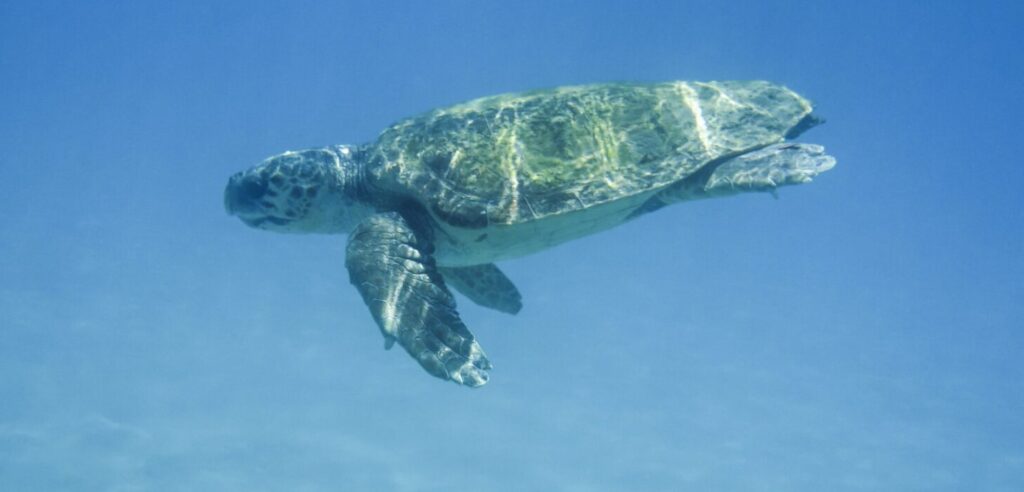
The Caretta Caretta or better known as the sea turtle is quite common around Kefalonia (Cephalonia) and has long lived in these waters. They often come to the surface to satisfy their curiosity, but they quickly disappear when approached. A scuba diving trip for inexperienced and/or certified divers can be arranged at anytime throughout your stay with us. Experience the clean waters and perfect visibility of the Ionian Sea and enjoy the underwater wild life. For those who do not have a licence, it can be obtained in about a week at the diving school in Agia Efimia. You could also go for a trial-dive in order to see if diving is something for you. There are designated diving areas just outside the bay of Agia Efimia, one of the few in Greece.
Canyoning and trekking in Kefalonia

is a new concept as not a lot of people know about the canyons in Kefalonia. Canyoning is not an activity that requires previous experience to participate. The rules are easy to follow, especially with the support of the experienced local guides. The tour will start with a trek up to the canyon, which will just take a few minutes. There is also a more challenging route for experienced participants.
The end of the canyon is a reward in itself. It leads to the Fteri beach with the most amazing crystal clear waters. The participants may indulge in a swim and some fruits to refresh themselves.
The tourists will then be picked up by a boat and taken to the small port in the village of Zola. The boat also takes the group up the bay to see all the other beaches which can only be reached by boat.
At the small port of Zola is a small fish tavern where tour members may choose to eat lunch before they head back.
Water sports

Visit some of the more popular beach resorts such as: Lassi – Makris Yialos beach, Poros, Skala or Fiscardo. If you prefer snorkeling there are hundreds of ideal waters around the whole island.
There are many organized activities in Kefalonia but if you just want to create your own activities there are plenty of places to explore and discover by yourselves by walking or taking off in the car to unspoilt areas all over Kefalonia. Try your hand at sea fishing, sailing, swimming or snorkeling from your boat into the deep clear warm waters of the Ionian Sea.

Fishing is very common throughout the waters within and around the island, and the harbours of Argostoli and Lixouri are the main fishing centres. Overfishing is a problem not only in Kefalonia, but in the Ionian Sea generally, because of industrial fishing.
Kefalonia is a popular vacation destination for tourists from all of the world, but especially the Italians honour the island, due to its close proximity to Italy. As one of the largest islands in Greece, it is well-equipped to handle the influx of tourists during the summertime. Kefalonia has something to offer everyone.
What to see in Kefalonia?
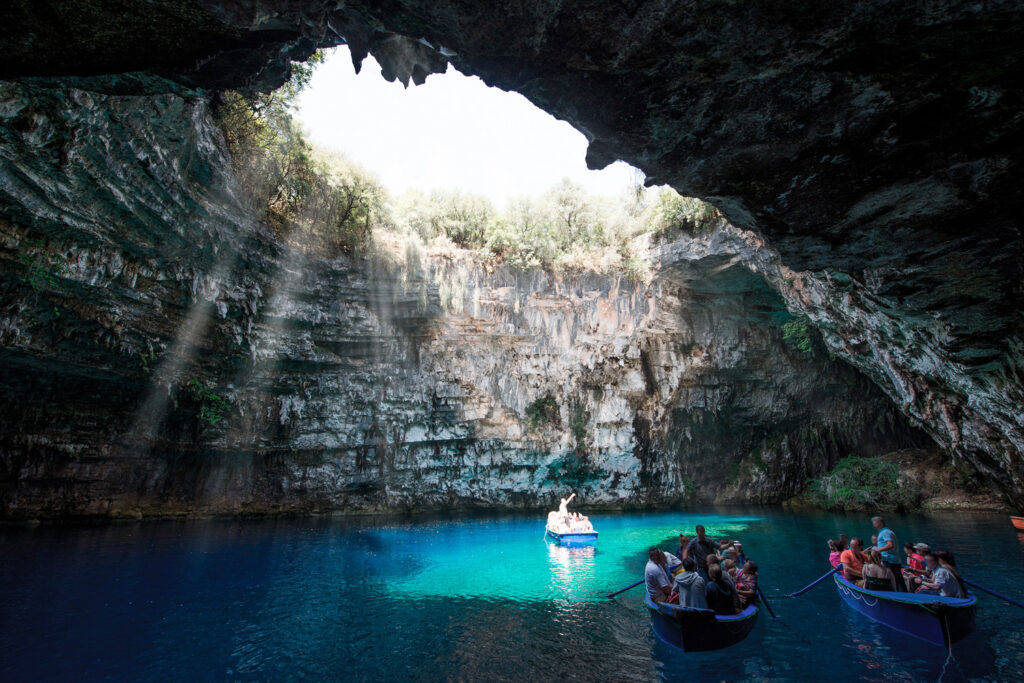
Two natural attractions, Melissani’s underground lake and Myrtos Beach, have helped making Kefalonia a popular vacation destination.
You might have seen the film Captain Corelli’s Mandolin, shot on the island in 2001. The film, with protagonists Nicolas Cage and Penélope Cruz, made Cephalonia more widely known. The film pays homage to the thousands of Italian soldiers executed at the Massacre of the Acqui Divison by German forces in Cephalonia in September 1943, and to the people of Cephalonia who were killed in the post-war earthquake.

The culinary tradition, the history, the traditional villages, the upbeat nightlife and pristine beaches will make you fall in love with Kefalonia.
Museums in Kefalonia
- Korgialeneios Museum (under the Korgialeneios Library) in Argostoli
- Kosmetatos Foundation in Argostoli
- Archaeological Museum in Argostoli
- Lakovatios Library in Lixouri
- Museum in Fiskardo
When to visit Kefalonia?
The best months to visit Kefalonia are probably May, June, September and October, where prices are a bit lower, the weather is great and there aren´t as many people on holiday. It only rains a little from May and the island blooms with flowers and green trees. Some of the beach facilities don’t open up until June, but that again can work in your favor – borrowing sunbeds and umbrellas without a fee. If you ask the locals, they will probably tell you that September is the best month to visit Kefalonia, everything is still open, the weather is great, not too hot and the sea is warmed up by the summer.

Kefalonia – Weather and climate
Like the other Ionian Islands Kefalonia has a mild Mediterranean climate with dry, hot summers and rainy winters. Rain is a common characteristic of the Ionian climate and in these islands the average annual rainfalls are three times higher than the one in the Aegean Islands. This is also the reason why the Ionian Islands, including Kefalonia, have plenty of forests, a dense vegetation, and fertile plains. In Kefalonia the winds never get strong, not even during summertime when in the Aegean Sea the strong winds of Meltemia are blowing.
| April | Maj | Juni | July | August | September | October | |
|---|---|---|---|---|---|---|---|
| Air | 15° | 18° | 23° | 31° | 28° | 18° | 18° |
| Sea | 14° | 17° | 21° | 24° | 23° | 21° | 20° |
Kefalonia has a typical mediterranean climate with mild winters and hot, dry summers. If you are a sunseeker the best season to visit Kefalonia is between June and August. The hottest month of the year is July with an average daily maximum of 31°C and an average low of 21°C.
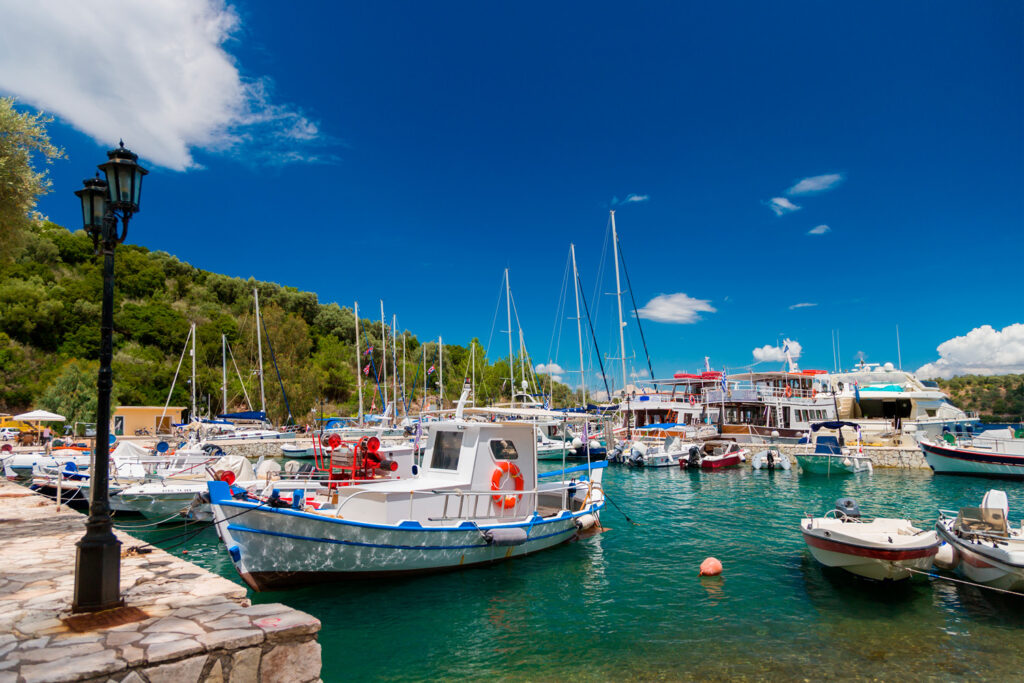
Lefkada Tours
TICKETS & THINGS TO DO:

